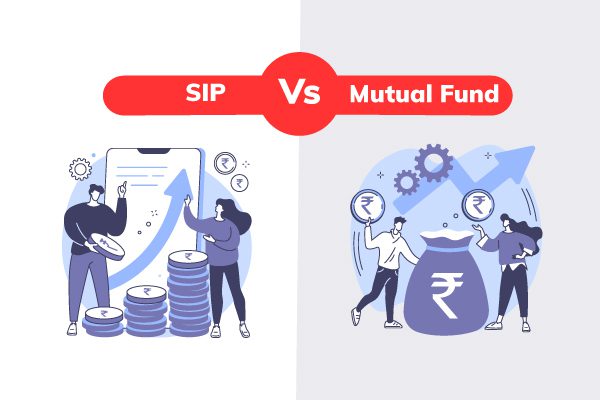Difference between SIP and Mutual Fund in Marathi : म्युच्युअल फंड गुंतवणुकीला अनेक गुंतवणूकदारांनी स्टॉक गुंतवणुकीसाठी एक सोयीस्कर आणि अनुकूल मार्ग मानले आहे. या गुंतवणुकीचे निरीक्षण आणि अंमलबजावणी फंड व्यवस्थापक म्हणून ओळखल्या जाणाऱ्या व्यावसायिक तज्ञांकडून केली जाते. स्टॉक्समध्ये गुंतवणूक करण्यापूर्वी, हे व्यवस्थापक कंपनीच्या मूलभूत गोष्टी, स्टॉकच्या किमतीचा ट्रेंड आणि भविष्यातील शक्यता यासारख्या विविध पैलूंवर सखोल संशोधन आणि विश्लेषण करतात.
त्यानंतर, ते त्यांच्या निष्कर्षांवर आधारित सर्वात योग्य गुंतवणूक पर्याय काळजीपूर्वक निवडतात. आता, एकरकमी पद्धतीने सिस्टिमॅटिक इन्व्हेस्टमेंट प्लॅन (SIP) आणि म्युच्युअल फंड गुंतवणूक यांच्यातील असमानता तपासू.

Difference between SIP and Mutual Fund in Marathi – SIP आणि म्युच्युअल फंड मधील फरक
1. Investment Mode
एसआयपीचा वापर गुंतवणुकीचे साधन म्हणून एसआयपीचा वापर करताना, म्युच्युअल फंडाच्या युनिट्सच्या अधिग्रहणासाठी सातत्यपूर्ण पेमेंट करण्यात गुंतले जाते, त्यामुळे नियमित गुंतवणुकीच्या सरावाला चालना मिळते. म्युच्युअल फंडाच्या युनिट्सची, ज्यामुळे नियमित गुंतवणुकीच्या सरावाला चालना मिळते.
Top 5 Online Learning Accounting Degree College In USA
2. Power of Compounding in SIP Investments
सिस्टिमॅटिक इन्व्हेस्टमेंट प्लॅन (SIP) मध्ये, गुंतवणूकदार नियमितपणे शिस्तबद्ध गुंतवणुकीत गुंततो, ज्यामुळे विशिष्ट कालावधीसाठी संपत्ती जमा होते. एसआयपी आर्थिक योजना आणि गुंतवणुकीची उद्दिष्टे साध्य करण्यासाठी अधिक अनुकूल दृष्टीकोन सादर करते.
म्युच्युअल फंड गुंतवणूकदारांना त्यांची कमाई किंवा परतावा पुन्हा गुंतवण्याचा पर्याय देतात. पैसे काढण्याऐवजी त्याच योजनेत पुन्हा गुंतवणूक करण्याचा पर्याय निवडून, गुंतवणूकदार चक्रवाढीच्या फायद्यांचा लाभ घेऊ शकतात..
3. Flexibility
एसआयपी गुंतवणूक वर्धित लवचिकता देतात, ज्यामुळे व्यक्तींना त्यांच्या सोयीनुसार साप्ताहिक, पाक्षिक किंवा मासिक, नियमितपणे थोड्या प्रमाणात गुंतवणूक करता येते. म्हणून, एसआयपी विशेषतः पगारदार व्यक्तींसाठी किंवा नियमित रोख प्रवाह असलेल्यांसाठी योग्य आहेत
4. Lower Cost
एखाद्याने सिस्टिमॅटिक इन्व्हेस्टमेंट प्लॅन (SIP) मध्ये गुंतवणूक करण्याचा निर्णय घेतल्यास, ते सरासरी खर्चाचा फायदा घेऊ शकतात. यामुळे बाजारात घसरण होत असताना अधिक युनिट्स आणि बाजार वाढत असताना कमी युनिट्स मिळवून एकूण खरेदी खर्च कमी करण्याची क्षमता समाविष्ट आहे. परिणामी, हे खरेदीची सरासरी किंमत कमी करण्यात मदत करते.
याउलट, गुंतवणुकीच्या एकरकमी पद्धतीमध्ये, एखादी व्यक्ती सर्व युनिट्स संभाव्य उच्च किंमतीला मिळवते, कारण सरासरीचा फायदा मिळत नाही..
SIP सुरू करण्यापूर्वी ह्या sip टिप्स नक्की वापरा! | sip investment tips in marathi
5. Volatility
गुंतवणूकदार, विशेषत: जे बाजारात नवीन आहेत, त्यांना बाजारातील प्रवेशासाठी इष्टतम वेळेबाबत वारंवार गोंधळाचा सामना करावा लागतो. एकरकमी पद्धतीने गुंतवणूक करताना, खरेदीची वेळ ही एक समर्पक चिंतेची बाब बनते, कारण यामुळे गुंतवणूकदाराला उच्च अस्थिरतेच्या काळात सामोरे जावे लागते.
सिस्टिमॅटिक इन्व्हेस्टमेंट प्लॅन (SIP) चा वापर करून, गुंतवणूक ठराविक कालावधीत पसरवली जाते, ज्यामुळे गुंतवणुकीचे काही भाग बाजारातील वाढीव अस्थिरतेच्या कालावधीपर्यंत मर्यादित ठेवतात.
What is a Mutual Fund in Marathi
म्युच्युअल फंड ही एक सामूहिक गुंतवणूक योजना आहे ज्याचा उद्देश गुंतवणूकदारांकडून पैसे गोळा करून एक सामान्य उद्दिष्ट साध्य करणे आहे. नमूद केलेल्या उद्दिष्टाच्या दिशेने काम करताना परतावा मिळवण्यासाठी फंड विविध मालमत्ता जसे की स्टॉक, बाँड आणि मनी मार्केट इन्स्ट्रुमेंट्समध्ये गुंतवणूक करतो. फंडाचे व्यवस्थापन मालमत्ता व्यवस्थापन कंपनी (AMC) द्वारे व्यावसायिकरित्या केले जाते आणि प्रत्येक गुंतवणूकदाराचा सहभाग त्यांच्याकडे असलेल्या युनिट्सच्या प्रमाणात असतो.
म्युच्युअल फंड हे एक प्रकारचे गुंतवणूक वाहन आहे जे स्टॉक, बाँड आणि इतर सिक्युरिटीजच्या पोर्टफोलिओमध्ये किंवा त्यांच्या संयोजनात गुंतवणूक करू शकते. हे गुंतवणूकदारांना वैविध्यपूर्ण पोर्टफोलिओमध्ये प्रवेश करण्याची संधी देते.
Mutual Fund information in Marathi – म्युच्युअल फंड मराठी माहिती
What is SIP?
सिस्टिमॅटिक इन्व्हेस्टमेंट प्लॅन (SIP) ही म्युच्युअल फंडांमध्ये गुंतवणूक करण्याची एक पद्धत आहे ज्यामध्ये ठराविक कालावधीत एक महत्त्वपूर्ण निधी तयार करण्यासाठी लहान, नियमित रकमेचे योगदान समाविष्ट असते. हा दृष्टीकोन गुंतवणूकदारांना नियमितपणे ठराविक रक्कम गुंतवण्यास प्रोत्साहित करून शिस्त लावतो, मग ती साप्ताहिक, मासिक किंवा त्रैमासिक असो. हप्त्यांमध्ये गुंतवणूक करून, गुंतवणूकदार त्यांचे मासिक उत्पन्न आणि खर्च नियोजित आणि समक्रमित पद्धतीने संरेखित करू शकतात. अगदी लहान संप्रदायांमध्येही गुंतवणूक सुरू करणे महत्त्वाचे आहे.
SIP बद्दल माहिती | SIP information in marathi | SIP कसे काम करते?
What is lump sum investment?
आता आपल्याला SIP म्हणजे काय हे स्पष्ट समजले आहे, तर आपण म्युच्युअल फंडातील एकरकमी गुंतवणूक या संकल्पनेचा अभ्यास करूया. एसआयपी आणि एकरकमी गुंतवणूक दोन्ही म्युच्युअल फंडांमध्ये गुंतवणूक करण्यासाठी भिन्न दृष्टिकोन देतात.
ज्या व्यक्तींकडे पुरेशी रोख रक्कम आहे, त्यांच्यासाठी म्युच्युअल फंडामध्ये एकरकमी गुंतवणुकीचा पर्याय निवडणे हा एक सुज्ञ निर्णय असू शकतो. ही निवड आर्थिक योजना, गुंतवणुकीची उद्दिष्टे आणि वेळ क्षितिज यासारख्या घटकांवर अवलंबून असते. दुसरीकडे, नियतकालिक उत्पन्न असलेल्या व्यक्तींना SIP मध्ये गुंतवणुकीचा फायदा होऊ शकतो.
जेव्हा तुम्ही म्युच्युअल फंडात एकरकमी पेमेंट करून गुंतवणूक करणे निवडता, तेव्हा तुम्हाला एकाच व्यवहारात सर्व युनिट्स खरेदी करण्याचा फायदा होतो. उदाहरणार्थ, जर तुम्हाला रु.ची गुंतवणूक करायची असेल. म्युच्युअल फंड योजनेत 12,000, तुम्ही गुंतवणूक पूर्ण करण्यासाठी एकवेळ पेमेंट करू शकता.
याउलट, एसआयपी तुम्हाला समान गुंतवणूक रक्कम रु. 12 महिन्यांच्या कालावधीत 12,000. हे तुम्हाला रु. गुंतवण्याची लवचिकता देते. 1000 दरमहा आणि त्यानुसार युनिट खरेदी करा.
वरील माहितीच्या आधारे, हे लक्षात घेणे महत्त्वाचे आहे की SIP हे एक स्वतंत्र उत्पादन, गुंतवणूक पर्याय किंवा साधन नाही. उलट, ही एक अशी प्रक्रिया आहे जी तुम्हाला म्युच्युअल फंडामध्ये गुंतवणुकीसाठी लहान परंतु नियमित रकमेचे योगदान देण्यास सक्षम करते, शेवटी तुम्हाला कालांतराने भरीव निधी तयार करण्यात मदत करते. दीर्घकालीन गुंतवणुकीचे उद्दिष्ट असलेल्यांसाठी एसआयपी विशेषतः फायदेशीर आहे.
शेवटी, म्युच्युअल फंडातील एसआयपी आणि एकरकमी गुंतवणुकीमधील फरक समजून घेणे हे माहितीपूर्ण गुंतवणूक निर्णय घेण्यासाठी महत्त्वपूर्ण आहे. तुमच्याकडे रोख रक्कम किंवा नियतकालिक उत्पन्न असले तरीही, दोन्ही पध्दती अद्वितीय फायदे देतात जे तुमच्या आर्थिक योजना आणि उद्दिष्टांशी जुळवून घेऊ शकतात.
Read this – IPO म्हणजे काय? संपूर्ण माहिती, फायदे, तोटे, IPO कसे तपासावे? | IPO Information in Marathi
Conclusion
पारंपारिक म्युच्युअल फंड गुंतवणूक पद्धतीला कंटाळा आला आहे का? SIP वर स्विच करण्याची वेळ आली आहे! SIPs भरपूर फायदे देतात जसे की लवचिकता, सरासरीमुळे कमी खर्च आणि अस्थिरता व्यवस्थापित करण्याचा एक प्रभावी मार्ग. तुमच्या कष्टाने कमावलेले पैसे गुंतवण्याचा हा हुशार मार्ग आहे.
जेव्हा एसआयपी वि म्युच्युअल फंडाचा विचार केला जातो तेव्हा उत्पन्न आणि कमाईच्या आधारावर गुंतवणूक करण्याच्या आपल्या सोयीचा विचार करणे महत्वाचे आहे. Scripbox च्या lumpsum calculator सह, तुम्ही मिळवलेल्या संपत्तीचा आणि परिपक्वता मूल्याचा सहज अंदाज लावू शकता. स्मार्टपणे गुंतवणूक करण्याची आणि SIP चे फायदे मिळवण्याची संधी गमावू नका.
FAQ
SIP किंवा म्युच्युअल फंड कोणता चांगला आहे?
म्युच्युअल फंडातील एसआयपी आणि एकरकमी गुंतवणूक यापैकी निवड करण्याचा निर्णय प्रामुख्याने निधीच्या उपलब्धतेवर अवलंबून असतो. एसआयपी तुम्हाला नियमितपणे थोड्या प्रमाणात गुंतवणूक करण्यास अनुमती देते, ज्यामुळे व्यक्तींना गुंतवणूकीची सवय विकसित करण्यास मदत होते. दुसरीकडे, एकरकमी गुंतवणुकीसह, तुम्हाला पुढाकार घेऊन गुंतवणूक करावी लागेल. एसआयपी गुंतवणूक स्वयंचलित असल्याने, तुम्हाला केव्हा आणि किती गुंतवणूक करावी याबद्दल काळजी करण्याची गरज नाही.
म्युच्युअल फंडापेक्षा एसआयपी सुरक्षित आहे का?
एसआयपी आणि म्युच्युअल फंड एकरकमी गुंतवणूक समान असतात कारण ते एकाच म्युच्युअल फंडात गुंतवणूक करतात आणि समान जोखीम आणि मूल्यातील बदलांना सामोरे जातात. परंतु जर तुम्ही दीर्घकाळ गुंतवणुकीची योजना आखत असाल, तर SIP चा वापर केल्याने तुम्हाला बाजारातील चढ-उतार संतुलित करण्यात मदत होऊ शकते.
माफक नियमित उत्पन्न असलेल्या गुंतवणूकदारासाठी उत्तम गुंतवणूक पर्याय कोणता आहे?
तुमचे नियमित उत्पन्न कमी असल्यास, तुमच्यासाठी गुंतवणूक करण्याचा सर्वोत्तम मार्ग एसआयपी असू शकतो. तुम्ही नियमितपणे थोड्या प्रमाणात गुंतवणूक करू शकता आणि तुम्ही योगदान देत असलेली रक्कम हळूहळू वाढवू शकता.
Related Pages –
20+ Small Business Ideas In Marathi
Health Insurance Information in Marathi


